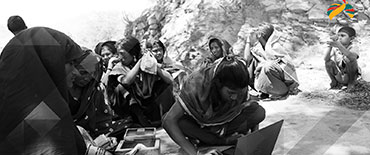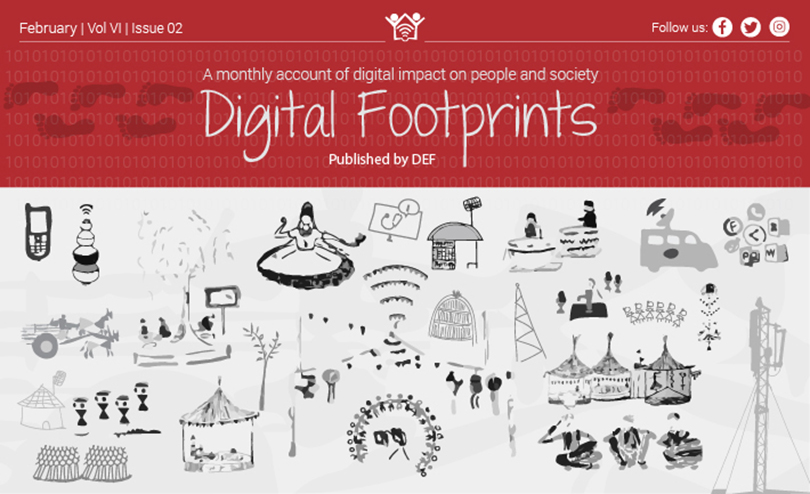

The world is standing at the crossroads. One way leads to inclusive globalisation and the other to exclusive localisation. While globalisation at the cost of local skills is certainly undesirable, sharing and engagement is the only way forward for any society and culture in the digital era that is the hallmark of inclusiveness. We cannot build walls around us and hope to grow. Hence, the war between globalisation and localisation shouldn’t result in throwing the baby out with the bathwater. Prayag means sangam or confluence; and that’s what we are championing through the first Digital India mela, ‘Prayag’.
Digital India mela Prayag is the confluence of lives, culture, tradition, heritage, ideas, thoughts, energies and more, all enabled by digital movements across not just India but South Asia. It is endeavouring to find a common complementing ground between globalisation and localisation. Globalisation enhances reach and accessibility that helps livelihood opportunities at the local level. Read More


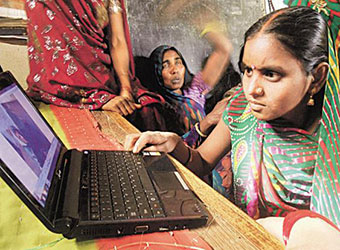


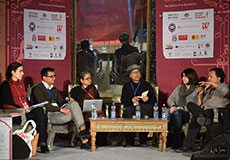
“Mythology tells us the story of samudramanthan, the churning of the ocean. The gods churned the Ocean of Milk; and from its depths emerged the most desired amrit and a fatal poison. Which of these did the Gods keep? This parallel emerged in a discussion at BookMark held on the sidelines of the Jaipur Literature Festival 2017,” writes JLF blogger Rushati Mukherjee. DEF Founder-Director Osama Manzar was among the panelists in this session that addressed the rise of digital media and how it simultaneously empowers and excludes marginalised voices.
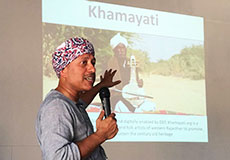
On January 29, 2017, Osama Manzar addressed an enthusiastic audience at the Museum of Goa on ‘The World of Unconnected Billions’. While addressing the audience, Manzar said, “While India is one of the top three countries in terms of the number of people connected to the Internet, it is also perhaps a country with the highest number of unconnected individuals. According to a World Bank report, more than a billion people are yet to be connected.” Prior to his session, Manzar also spoke to Navhind Times about why he thinks India is not yet ready for a cashless society.
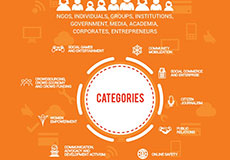
Social Media for Empowerment Awards is back with its 4th edition. If your social media initiative is empowering the community, then nominate it for SM4E Awards 2017. The platform is accepting nominations across nine categories from all eight South Asian countries — Community Mobilisation; Public Relations; Women Empowerment; Social Games & Entertainment; Social Commerce & Enterprise; Crowdsourcing, Crowd Economy & Crowd Funding; Communication, Advocacy & Development Activism; Citizen Journalism; and Online Safety. For more information, visit www.sm4e.org.
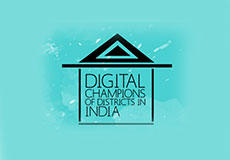
The annual District Collector Digital Champion Award is being organised for the fourth time under the flagship of Manthan Awards South Asia. The awards look at recognising and encouraging the implementation of ICT at the district level to break the traditional mode of public delivery mechanisms in governance. This year, 50 nominations were received from various parts of India. Following a Virtual Jury that filtered 25 nominations for final evaluation, the Grand Jury has shortlisted 16 finalists. Winners will now be announced at Surajkund Mela Ground, Faridabad, on February 25, 2017.
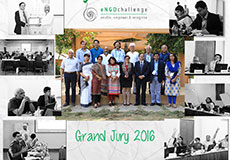
The 5th edition of eNGO Challenge Awards will take place under the larger umbrella of Prayag 2017. This time, eNGO Challenge opened its nominations for all grassroots organisations, irrespective of their work domain and whether or not they use digital tools to reach out to grassroots communities. This year, the platform received 331 nominations from eight South Asian countries. After the initial screening, 157 of them reached the intensive Jury process, and 62 were shortlisted as Finalists. The comprehensive process has brought some brilliant initiatives into focus. Read More
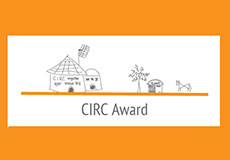
The CIRC Awards are aimed at recognising those DEF centres — and its unsung heroes — that have shown exemplary efforts at bringing about a transformation in rural communities. This year, CIRC Awards received 93 nominations across five categories. Out of these, 11 have been shortlisted as winners by Grand Jurors DEF Founder-Director Osama Manzar; Lead – Community Affairs at Microsoft India Manju Dhasmana, Senior Journalist Soumya Sarkar, and Senior Manager Wireless Reach at Qualcomm Anirban Mukerji. Winners will be announced at Prayag on February 25, 2017.

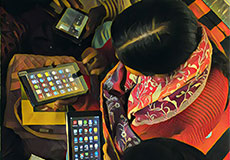
Internet Saathi is an initiative launched by Google India in collaboration with TATA Trusts. DEF, as one of the implementation partners, aims to mobilise 3,000 women volunteers (or Internet Saathis) and equip them with ICT tools and knowledge to connect remote communities with the mainstream world and bring them out of information darkness, thus bridging the digital divide. These 3,000 women will further train others in digital tools, eventually reaching out to 18,00,000 beneficiaries (90 per cent of whom will be women) across 10,000 villages of Bihar and Madhya Pradesh over a period of six months.

More than 300 community members have been digitally enabled at the Oracle-funded CIRC in Gola block of Ramgarh district in Jharkhand in January alone. Further, the local team has helped 80 men and women get their labour cards, which will enable them to access a range of government schemes. The centre also makes banking services accessible to villagers. What makes this centre unique among other CIRCs is its sustainability model, under which DEF has only supported the centre with infrastructure while all other running expenses are being met by the centre from Day 1.
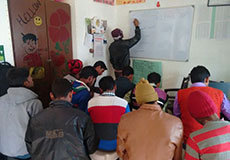
Wireless for Communities (W4C) training classes have commenced at the Baank-e-Loom centre in Barabanki district of Uttar Pradesh. This training is for individuals who have already completed their basic digital literacy course and want to learn network engineering. The course will enable these future Barefoot Wireless Engineers to not only run and manage networks but also set up towers and connections, besides troubleshoot. W4C is a project that aims to connect remote communities through low-cost technology, and train individuals in managing community-run networks.


The ground team of Community Information Resource Centres (CIRCs) across India’s 22 states started the New Year with an energetic door-to-door campaign to assess people’s needs and find solutions for them. While every centre coordinator’s contribution has been extremely meaningful, Ramesh Meena and Utkarsh Singh were particularly motivated. While Meena went around Malakhera (Rajasthan) talking to people about government services & schemes, Singh sat down with homemakers in Barabaki (Uttar Pradesh) to encourage the use of digital media to contribute to their household incomes.

British Council’s English and Digital for Girls’ Education (EDGE) programme seems to be becoming extremely popular among girls. As many as 443 out of a target of 525 )girls have already enrolled for EDGE. A key aspect of this programme was the selection of Peer Group Leaders (PGL) among girl students, in January, who will be responsible for organising and facilitating club activities, encouraging participation of club members, maintaining records of attendance, and communicating the successes or challenges of the project team. The selected PGL will be trained for their role in February.
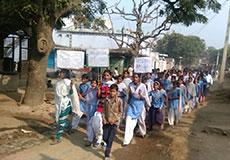
On the occasion of National Girl Child Day on January 24, 2017, CIRC Bahadurpur in Darbhanga district of Bihar organised a rally on the streets to promote Beti Bachao, Beti Padhao. Students from local government schools participated in the rally to raise their voice against female foeticide and for girl child education. The peaceful rally saw people holding banners and posters, spreading the message of empowering girls. Later in the day, an interactive session was organised with Village Secretary Kavita Saini and Sarpanch Sahun Khan to discuss how education transforms communities.
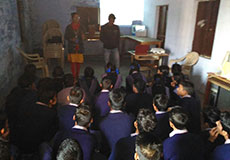
Ealier this year, the local team of CIRC Halduchaur in Uttarakhand visited Khastidev Madhyamik Vidyalaya to meet school officials and speak to them about the benefits of a new digital literacy course for school students. To help the school authorities gauge the teaching methods and show how engaging and useful these classes can be, the CIRC team held a demonstration class for a small group of students. The results were good, and the team will now be taking regular digital literacy classes at the school for the benefit of its students. These classes will be held by the staff in addition to the teaching hours at the CIRC.

CIRCs across the country celebrated National Youth Day on January 12, 2017. Various art, sports and awareness activities were organised at different centres. At CIRC Halduchaur, children participated in a digital painting competition while CIRC Jauhar Academy hosted a fun-filled sports day. CIRC Nichlagarh, in collaboration with government schools in Nichlagarh and Upalagarh, hosted a career day where the CIRC team discussed how digital literacy can increase employability among youth. Benefits of computers and the Internet were also discussed with youngsters to encourage them to adopt technology and digital tools.


Mayuri (the peacock-motif saree) has become Chanderi’s best-selling handloom product of 2016. The saree, which was first made during an ad shoot for Intel, was only available in red earlier. Looking at the high demand for the saree, weavers have now been weaving the saree in various colours. Interestingly, weavers associated with the Chanderiyaan project like to give a unique name to all their sarees rather than identify it merely as booti-wali saree or more-wali saree. A red bridal saree has been named Ghunghat and a black-and-golden one is called Rida. There are Jasra and Ahlina too.
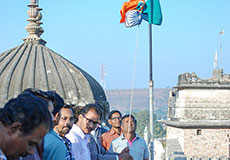
On January 24, 2017, a meeting was organised in Chanderi, Madhya Pradesh, to reflect on the roles of Common Service Centres (CSC) in facilitating cashless services in villages. Attendees in the meet included the DMs of Ashoknagar (Deepak Dubey) and Mungwali (Tauhid Khan). From Chanderi, Chanderiyaan team members Nishant Tyagi and Arshad Raza participated in the meeting and raised the problems of frequent technical glitches on IRCTC, Rupay and government bank websites. Two days later, the 68th Republic Day was celebrated with great fervour at the Chanderi centre.
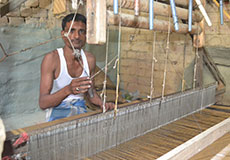
Between November and January, Saindapur village in Barabanki district of Uttar Pradesh has witnessed a massive drop in business for handloom weavers. Once flourishing with the clitter-clatter sound of handlooms, Saidanpur — which is home to 200 weaver families — today complains of acute lack of work. Due to lack of cash flow in the local economy, weavers find themselves without work for days at a stretch. This is a story of Saidanpur, where average daily household income for a family of six to eight is Rs. 120. So you can well imagine the condition of the families, and how they must be finding it hard to meet their daily needs. Read More

Yashoda Devi is 71 years old. A resident of Parsa village in Barabanki district of Uttar Pradesh, she lost her husband at the age of 40. Since then, she has had the sole responsibility of raising her eight children. Wages in Barabanki are low, and families are big. It’s almost the same story in every household but Yashoda Devi’s age acts as a further disadvantage for her family. However, she has been making ends meet somehow by working in fields or people’s houses. That’s how she has been able to afford her children’s education. And now she wants to learn to operate a laptop and surf the Internet. Read More
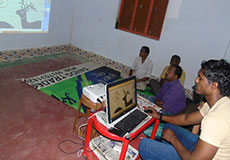
For wider adoption of digitally designed graphs by Ikat weavers of Barpali and Nuapatna in Odisha, consultation workshops were recently organised at DigiKala centres in both the regions. DigiKala, an initiative of Microsoft and DEF, aims to digitally enable the weavers in these two handloom clusters. The workshop was organised to address the inhibitions of weavers in learning to design on computers. DEF team members and design experts demonstrated to weavers how one can design more accurately and faster on a computer, thus creating a wide range of innovative designs. Read More
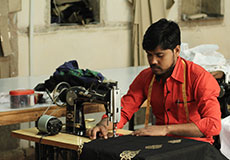
Sultan is tailor who lives in Chanderi, Madhya Pradesh. A Class V dropout, he recently joined the Chanderiyaan family at the town's Raja Rani Mahal from where the project operates. Here is what he has to say about his new experience. “I used to work as a tailor at a shop with three other artisans. I cut cloth and stitched kurtas, pyjamas, pants and shirts for men. However, it was after I joined project Chanderiyaan that I realised I could make many more things. Here, I’ve learnt to make Chanderi silk kurtas for both men and women. And I am even stitching cotton hand bags!” he says. Read More

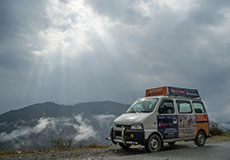
The Soochna Seva team of Ranchi district in Jharkhand organised a pension camp in Sonahatu block last month. At this camp, villagers were informed about as many as 22 government pension schemes that they can avail in their region, besides the importance of digital literacy. Among the villagers, 64 were helped on the spot in filling up e-applications for various schemes. Meanwhile, it was a proud moment for the Soochna Seva team when the Soochna Vahan was included in the district administration’s Republic Day Parade amid much celebration in Guna, Madhya Pradesh, on January 26, 2017.
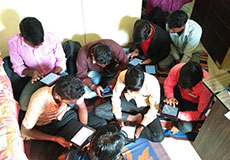
A two-day workshop was conducted for the newly recruited batch of 10 SoochnaPreneurs (in Barpali block in Orissa on January 5-6, 2017. The aim of the workshop was to reinforce entrepreneurial skill sets and desired behavioural and attitudal changes in SPs for enhanced productivity at work. One of the key objectives of the workshop was to design an effective mechanism for carrying out their role and give SPs a hands-on training on the MIS, which they will need to operate on a daily basis to submit project updates. This workshop was led by DEF trainers Abdul Vahid and Abu Maroof. Read More
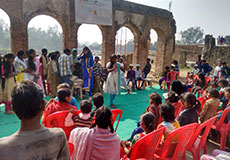
India’s first Chief Information Officer and former governor of Jammu & Kashmir, Wajahat Habibullah, celebrated India’s 68th Republic Day at a cultural programme with students of Baank-e-Loom centre in Saidanpur village of Uttar Pradesh. Various other centres celebrated the day in their own ways. Some hoisted the flag while some others took out rallies to make people aware of what makes up the Constitution of India. CIRC Srikakulam held an essay writing competition and CIRCs Malakhera organised a community drive to people talk about digital literacy, education and sanitation.


The Research & Advocacy Team of DEF has been working on developing a training toolkit on digital security for children and educators. The toolkit, which focuses on safe online browsing, strong password creation, threat assessment and data hygiene, is seen as an important addition to school curriculums due to the rising importance of ICTs and increasing engagement of children with technology. The toolkit, especially designed for children aged between 10 and 14, would be ready by the end of the first quarter of 2017; and be implemented in schools at the start of the second quarter.

The IMPACT project team would like to flag their concern at the rising trend of online intolerance and the dilution of free speech online in the country. Over the past few months, with the launch of contentious government programmes and other developments, conversations of both sides of the aisle have been under attack, with vitriolic accusations being hurled at individuals who are merely exercising their rights to free expression. We, at Digital Empowerment Foundation, urge the State to not interfere in the citizen’s right to free expression and respect even those opinions that may be critical of them.




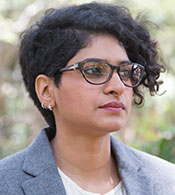
Change.Org India

House No. 44, 3rd Floor, Kalu Sarai, New Delhi | def@defindia.net | www.defindia.org | +91-11-26532786





